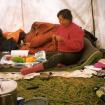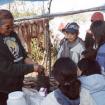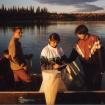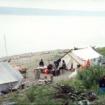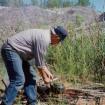Education is an important part of GSCI's programming and is offered in several forms. One involves actual experience. The other includes presentations, supplemented by print and video and the development of curricula.
Experiential Programs
Research projects, science camps, language immersion camps and language mentor programs fall under experiential education. All provide community members with opportunities to learn about Gwich'in culture, history and the land by working with Gwich'in Elders, and professionals or graduate students from such disciplines as anthropology, biology, and geography. Training might include archaeological, linguistic or oral history interview techniques. Transcription, translation, map reading, orienteering and the use of a variety of equipment are other skills learned on the job
Publications, Presentations and Curriculum Materials
The GSCI provides educational materials to schools in the Beaufort-Delta region based on its research projects. For example, a comprehensive history of the Gwichya Gwich'in as told by the Elders of Tsiigehtchic, a Gwich'in Dictionary and calendars featuring Gwich'in Elders are available. A Gwich'in Ethnobotany Plant Kit contains samples of over 30 plants along with their English, Latin, Teetl'it and Gwichya Gwich'in names, and descriptions of traditional plant usage. Videos on the Gwich'in Traditional Caribou Skin Clothing Project and on the traditional use and history of Tsiigehnjik (the Arctic Red River) are also available. Community events, such as the unique wedding of Eva and Hugh Colin (The Bell with a Name) have been turned into teaching tools as well.
The GSCI also delivers workshops to schools, community groups and corporations on subjects ranging from archaeology and management of heritage resources, to ethnobotany, place names and oral history.
The GSCI and the Inuvialuit Cultural Resource Centre collaborated on a Second Language Curriculum that is being used in the Beaufort-Delta region. Funding was provided through the Beaufort-Delta Divisional Education Council. This curriculum, for K-12, establishes consistent standards and grade appropriate learning outcomes based on clear goals and objectives.

